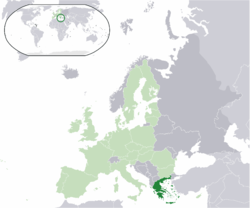Greece: Release Of Secret Bank List Leads To Journalist’s Arrest
By SETimes
By Andy Dabilis
A Greek investigative journalist who released a list of 2,059 people with 1.5 billion euros in deposits in a Swiss bank that was being kept secret by the government said his arrest for breaching the country’s privacy laws was a political attempt to hide the truth from Greeks who are undergoing waves of austerity measures.
“Instead of arresting the tax evaders and the ministers who had the lists in their hands, they’re trying to arrest the truth and stifle the freedom of the press,” Costas Vaxevanis, who published the list on his website Hot Doc said after he appeared in court on Sunday (October 29th) and was released.

His trial is set for Thursday, an unprecedented swift action by a government which has let tax evaders trials linger for a decade or more in some cases.
Vaxevanis said his list was the same as one with 1,991 names that was first given by then-French Finance Minister Christine Lagarde — now head of the IMF — in 2010 to then-Finance Minister George Papaconstantinou, who recently said it had been lost.
That set off a frensied attempt by current Finance Minister Yiannis Stournaras, who is in intense negotiations with the EU-IMF-ECB Troika on a package of 13.5 billion euros in spending cuts and tax hikes, to find it. Papaconstantinou’s successor, Evangelos Venizelos, now the head of the PASOK Socialists, one of Prime Minister Antonis Samaras’ coalition partners, produced a version on a flash drive.
But the mishandling prompted Greece’s Supreme Court to assign a prosecutor to find out why neither Papaconstantinou nor Venizelos — and two previous financial crimes squad chiefs — failed to check for potential tax cheats costing the country 50 billion euros in lost revenues.
New austerity measures are again aimed primarily at workers, pensioners and the poor, and Greeks are furious that tax evaders are escaping sacrifice, while many believe the government and business executives are in cahoots to protect each other.
The names listed include former Prime Minister George Papandreou’s brother, politicians, an advisor to now Prime Minister Antonis Samaras, well-known businessmen, journalists, doctors, lawyers and engineers, actors and civil servants – some of them working at the Finance Ministry. But the names also include students, pensioners and housewives.
The government has not confirmed if the names are the same as those on the Lagarde List, and Vaxevanis said that those with deposits in the Geneva branch of HSBC should not be considered tax evaders. But, he said, the government should have investigated to find out if any had failed to declare their accounts and pay taxes on them.
Venizelos, a constitutional lawyer, said because the information first came from a CD stolen by a bank employee that he couldn’t use it, but Lagarde said other countries have done so.
“What Vaxevanis did is quite tricky because he doesn’t have the right to publish that kind of personal data,” George Tzogopoulos, a research fellow at the Hellenic Foundation for European and Foreign Policy told SETimes. Vaxevanis said because he did not include the amounts of the deposits that he had not violated the law.
“The previous finance ministers didn’t focus on investigating to what extent people may have been involved in tax evasion and now it may be too late,” Tzogopoulos said. “They wanted to put the list in the draw and not do anything about it because it was a headache for them.”
The Greek chapter of Reporters Without Borders issued a statement that Vaxevanis was being unjustly prosecuted. “The pressure created by the arrest of a reporter is clearly disproportionate. This procedure simply encourages an excessive cover-up,” it said.
Haralambos Tsardanidis, who runs the Athens-based Institute for International Economic Relations, said that Greeks who hide money in offshore accounts and foreign banks without having it taxed are hurting the country’s efforts to right itself.
But while he blamed the government for not vetting the list, he said Vaxevanis shouldn’t have released it. “The people who appear are not, by definition, trying to evade taxes or launder black money,” he told SETimes. “But it’s up to tax officers now to cross check declarations and see if people can justify their incomes.”
The New Democracy party Conservative leader Samaras’ government must reach an agreement with the Troika – which has pushed him to go after tax cheats – on the 2013-14 budget plan so that a pending 31.1 billion euros loan installment can be released. Samaras said the government will run out of money by November 16th otherwise.
